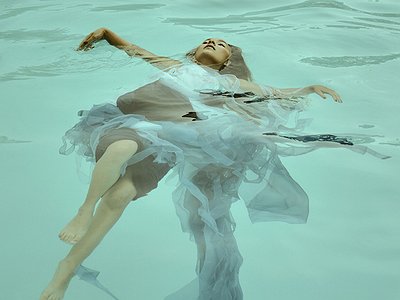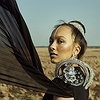Part 2
Could you take us through a day in your life, from a possible morning routine through to your work? Do you have a fixed schedule? How do music and other aspects of your life feed back into each other - do you separate them or instead try to make them blend seamlessly?
If I had to sum it up briefly, this would be it: I wake up at 10 am every day, get ready, make music, and go to bed.
I try to go with the flow of things and see where the day takes me. I tried a fixed schedule once, but it didn’t make sense to me because you can’t really plan for creativity to happen. Also, I didn’t want to limit myself in the sense that, after 3pm I should be working on social media and not songwriting anymore. I have a lot of stuff on my to-do list that I get done, I just always prioritize tackling the things I feel most inclined to do in that moment first.
Nevertheless, I tend to do office stuff or writing lyrics late at night, and the actual singing and songwriting during the day, because I work in my home studio and have neighbors. I can concentrate best at night though, when everything around me is quiet, so I’ll stay up until 2 am to finish up stuff, write lyrics or, to my neighbors’ delight, sometimes songs. I do that until I can’t keep my eyes open anymore.
Could you describe your creative process on the basis of a piece or album that's particularly dear to you, please? Where did the ideas come from, how were they transformed in your mind, what did you start with and how do you refine these beginnings into the finished work of art?
My song “City of Dust” came from an experience I had and wrote about the next day. A feeling of being placeless, timeless almost, going on an adventure with someone I had just met.
I was just jamming around and in that moment I had kind of forgotten about it, or so I thought, but it was like the song wrote itself out of my subconscious. It took me about 30 minutes to write the whole thing. I was able to revisit exactly what I was feeling the night before, through songwriting. The memories were etched much deeper into my mind than I had imagined.
The tricky part was producing the song. I wanted that same feeling of weightlessness to be conveyed perfectly, exactly how I had experienced it, and simply couldn’t find the right sounds to do so, nothing really fit. I had the whole production finished, but it didn’t feel right to me. Only when I turned it all over and introduced the LFO pad that you can now hear throughout the song, it pulled the song together. After I added the ending bit with just the piano and my voice singing “Tonight this city doesn’t have a name”, that was when I finally knew the song was done.
There are many descriptions of the ideal state of mind for being creative. What is it like for you? What supports this ideal state of mind and what are distractions? Are there strategies to enter into this state more easily?
It sounds paradoxical at first, but the more you want to get to that state, the less likely it is you will. You never know when that creative spark will hit, but you really can’t force it. Still, by being in the studio a lot and encouraging the right headspace, you are welcoming it. Being in a clean and organized space always helps me, and I am more creative when that space is dark. I almost always completely turn off the lights.
I’m most creative when I’m invigorated by my own dreams, or other people’s art. That does not necessarily mean music. Once you visualize in front of yourself Why you do what you do and how much of a blessing it really is, you really write out of love and passion for what you’re able to create.
Distraction-wise, I have definitely fallen victim to social media, especially Instagram, which is why I have deleted the app from my phone and deactivated my personal account.
Another thing that can distract me is getting caught up in comparing myself to other artists while I’m in the creative process. Over the years I’ve learned that it’s best to let it all out first and compare afterwards.
How is playing live and writing music in the studio connected? What do you achieve and draw from each experience personally? How do you see the relationship between improvisation and composition in this regard?
I don’t really have any experience playing live yet. 2020 was going to be the year I would finally start playing shows, but because of Covid, of course nothing went as planned. I did play one open-air gig with Booka Shade at Ritter Butzke, where they brought me on stage for our song “Polar Lights.” Being on stage performing that song gave it such a different context to me than what I had connected with it before. I would definitely say that after that show, I no longer compose just for myself, but I always have an audience in mind.
From what I have seen as someone attending concerts, live shows give the music a face and make it much more personal. People attach their own little memories to an artist. Playing live combines audio with visual, with smell, touch, taste - it becomes an experience. That is ultimately what I want my live shows to be. An experience.
How do you see the relationship between the 'sound' aspects of music and the 'composition' aspects? How do you work with sound and timbre to meet certain production ideas and in which way can certain sounds already take on compositional qualities?
To me they are interrelated. One cannot live without the other. If you compared it to a painting, the composition is the portrayed idea, whereas sound is the color.
Most of the times, composition precedes sound, but they interplay. I usually like to try out different sounds after a composition is done and see what each of them evokes in me. If I change a sound and suddenly come up with a vocal line that matches the energy of that new sound better, I change the composition again. It’s really an ongoing process.
Our sense of hearing shares intriguing connections to other senses. From your experience, what are some of the most inspiring overlaps between different senses - and what do they tell us about the way our senses work? What happens to sound at its outermost borders?
Being a musician is strange, because you basically sell air. I think we’re the only job that does that, and I think we’re able to do so, because hearing truly is the most sensitive sense. It is not scientifically measurable where music replaces noise, but the brain easily makes that distinction.
Our main means of communication is language, which is sound. Words can truly move mountains, and there are certain rhythms where we simply can’t sit still. It’s absurd, sound is almost like this higher power, that moves us more than any other sense could ever do.
I’ve always admired people with synaesthesia, that could taste, smell, see their music. Sometimes I forget that sound isn’t invisible, even to someone who doesn’t have synaesthesia. If you turn up the music loud enough, you can feel the vibrations go through your entire body, see them, touch them. So much so, that your heartbeat adjusts to the beat of the kick if you do it long enough.
Our senses definitely communicate with each other, and hearing plays a big part in that. Bigger than we might give it credit for.
Art can be a purpose in its own right, but it can also directly feed back into everyday life, take on a social and political role and lead to more engagement. Can you describe your approach to art and being an artist?
Art to me is expression and creation. The creation of a new world, with different rules, different sounds, different visuals than our normal one. Even though we all live on the same planet, we are all living our own version of it. Our own perception, our own surroundings, in the end we’re only a tiny shell filled with values, memories, perspective, floating around in space. I want art to be a new world which one can enter and find a home in. Not exclusively one, a person can “live” in many different worlds after all.
It is remarkable, in a way, that we have arrived in the 21st century with the basic concept of music still intact. Do you have a vision of music, an idea of what music could be beyond its current form?
Something that has always intrigued me is musical therapy. Isn’t it crazy how music can heal us from emotional and physical health issues? I would love to learn more about it in the future, and see it become more widespread and accepted than it currently is.
Music is already medicine to most of us.
Another advance I already see regarding music, is how it is increasingly paired with visuals. Spotify Canvases are a great example for that. If you combine that with the general technical developments of today’s world, like VR headsets, 4D audio etc. I think it has potential to become much more immersive.
I also think, especially in the wake of the pandemic, concerts will evolve along with the way we consume music as well. We already have real-life artists playing virtual Fortnite concerts, and gaining a lot of fans through it. Take that one step further, and who says hologram concerts won’t be a thing? Especially for those who are not able to come to a “real” concert. Who knows where the future will take us?






